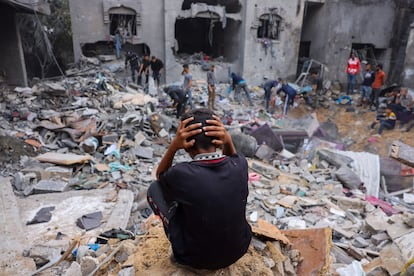Ukraine is suffering in Gaza
The divisive effects of the war in the Strip are a blessing for Putin. The fracture lines are showing in public opinion, in democratic institutions, in governments and in international organizations

War is uncertain by definition. It can change course suddenly due to factors that are beyond the individuals directing it, and even more markedly beyond those who seek to understand what is happening on the battlefield. It is a cliché of military doctrine that there is not a single plan that can withstand entry into combat.
Now the war in Gaza has given Putin the opportunity to gain in the Middle East what he has already lost in Ukraine. His war and atrocities are being overshadowed by the atrocities of Hamas and of the far-right Israeli government in the attention of the media, governments and international institutions.
The escalation of the horror, stimulated by digital warfare, has become an auction in which each party seeks to neutralize its own perversities by displaying those of the others. Between the barbaric images of the incursion of Hamas terrorists into Israel and the assault by Israeli troops on the Al Shifa hospital complex, the brutal images of Bucha and Irpin have been pushed to the background.
The new war not only has propaganda effects, but also affects artillery supplies, which are essential in the war of attrition, to the detriment of the Ukrainian army, which is increasingly running short of ammunition. Israel has begun to compete with Ukraine in the demand for projectiles, while Russia has managed to fine-tune its war industry in these two years. There are now two world markets: the western one with enormous difficulties meeting demand and rising prices, and the eastern one with sufficient production, increased by the supply from North Korea and Iran.
The divisive effects of the Gaza war are a blessing for Putin. They not only affect the supply of weapons, in which the United States gives preference to Israel’s demands. The fracture lines are showing within public opinion, democratic institutions, governments and international organizations. Unlike the war in Ukraine, which aroused pacifist or indifference reactions, especially in the so-called Global South, the war in Gaza is causing an isolation of Israel and its closest allies and an enormous tear in Western countries, where generational change and the weight of the population of Arab or Muslim descent makes it difficult to understand the practically unconditional solidarity of their governments with the Netanyahu administration.
Putin is stuck in Ukraine, entrusting the course of the war to chaos in the ranks of his designated enemy, that collective West that within a year may have Donald Trump as its leader. Ukraine’s only success these days is the proposal to open accession negotiations with the European Union. Although it is loaded with symbolism, it also contains a warning about the urgency of peace in the face of the possibility of endless war or even slow defeat due to fatigue.
Sign up for our weekly newsletter to get more English-language news coverage from EL PAÍS USA Edition
Tu suscripción se está usando en otro dispositivo
¿Quieres añadir otro usuario a tu suscripción?
Si continúas leyendo en este dispositivo, no se podrá leer en el otro.
FlechaTu suscripción se está usando en otro dispositivo y solo puedes acceder a EL PAÍS desde un dispositivo a la vez.
Si quieres compartir tu cuenta, cambia tu suscripción a la modalidad Premium, así podrás añadir otro usuario. Cada uno accederá con su propia cuenta de email, lo que os permitirá personalizar vuestra experiencia en EL PAÍS.
¿Tienes una suscripción de empresa? Accede aquí para contratar más cuentas.
En el caso de no saber quién está usando tu cuenta, te recomendamos cambiar tu contraseña aquí.
Si decides continuar compartiendo tu cuenta, este mensaje se mostrará en tu dispositivo y en el de la otra persona que está usando tu cuenta de forma indefinida, afectando a tu experiencia de lectura. Puedes consultar aquí los términos y condiciones de la suscripción digital.









































